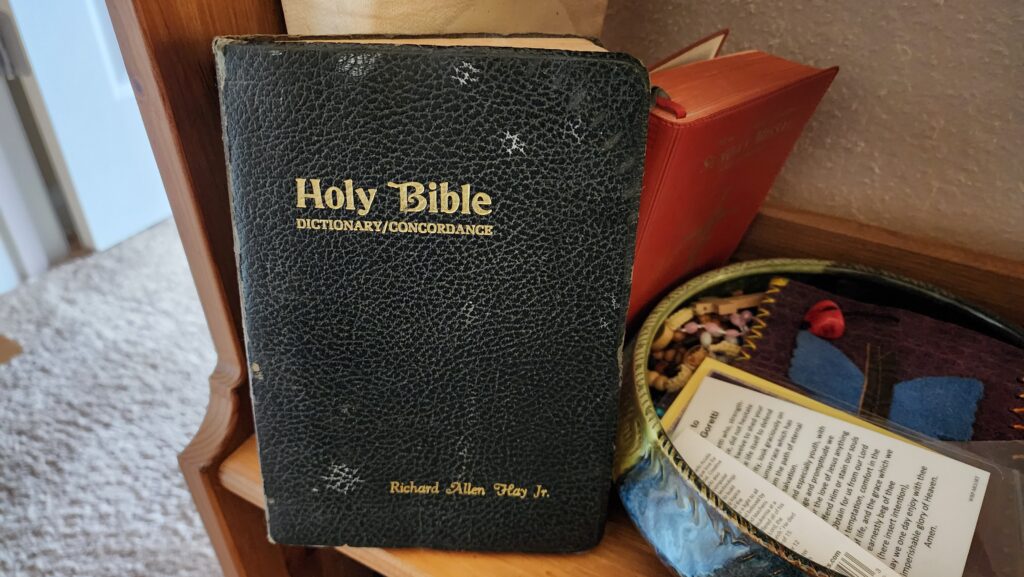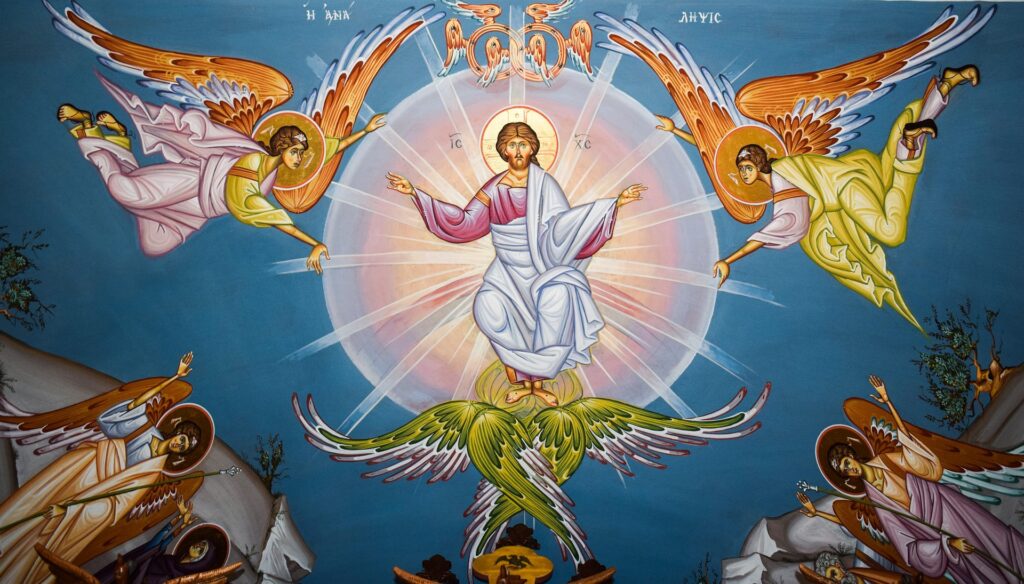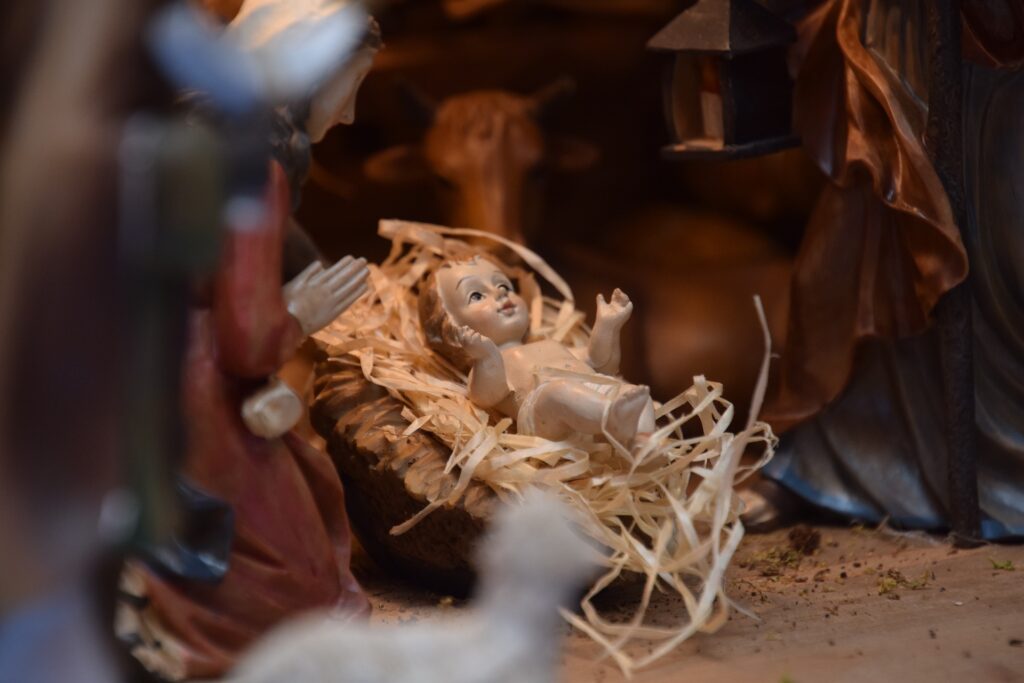
By Deacon Richard Hay
“God’s love for us…”
When I was a young kid growing up, my Mom and Dad would hold a bible study once a week and teach us about the stories and characters all throughout the bible – both in the old and new testaments. They had a system where if we could answer various questions about something we had learned or heard from the bible that week, we would earn points. Eventually, once we had earned enough points, we would receive our own bible that had our names embossed on them in gold lettering.
That bible is 46 years old; it survived a flood in 1979 and continues to be in my home on a bookshelf over these last 46 years.
I bring this up because the stories I remember the most from those bible studies were those from the Old Testament because they were so different than those in the New Testament. In the Old Testament there was a lot of murder, mayhem, disobedience, and turning away from God. Those are the kind of stories that catch our attention as children.
However, over time, as I learned more about the stories in the New Testament, those descriptions of God’s love, the gift of His Son, and the Holy Spirit, start to be a point of connection that makes more sense.
Then over time, we can start to see in the Old Testament that what appeared to be a vengeful God – was actually a God full of love for His people and today’s readings really bring out that love.
In Exodus, those words of God’s comfort show his care for His chosen people. He pleads with the Israelites to remember his outpouring of love, protection, and gentle leading during their desert journey.
Then in the responsorial psalm, we hear a call to give praise and thanksgiving for God’s care and we respond by saying that we “are his people – the sheep of his flock.”
In the letter to the Romans, St. Paul reminds us that God proves his love for us when he sends his Son to die on the cross even though we were still sinners. He also reiterates that there is no greater act of God’s immeasurable love than his Son’s crucifixion.
In the gospel from Matthew, we hear that the Lord was moved to pity for the crowds who sought him. However, that pity wasn’t like feeling sorry for someone, but it was much more like compassion because he saw that we were sheep without a shepherd, and he willingly accepted that role as our shepherd to lead and guide us so that we are not wandering aimlessly through life.
All of this was an initiative from God and not dependent on some humble display of worship, praise, trust or obedience on our part but a completely grace filled action in the covenant relationship he wants to have with us. It was a genuine commitment to our wellbeing – to our salvation – so that we could each have a personal relationship with him.
Jesus, in fulfilling his Father’s will on the cross, made every one of us worthy of his suffering and death – there were no exceptions – no one is left out of that gift. It doesn’t matter how unworthy we might feel at any given time in our lives. Christ died for you, for me, for all of us.
Nowhere else in this world are we going to find this kind of love. People and things of this world can be insincere, harsh, and hurtful in their words and actions. Even our most powerful relationships within our families – based on the deepest love as we understand it, pales in contrast. The love of Jesus Christ is sincere and unchanging – totally sacrificial – totally immeasurable.
Since Christ’s side of this relationship never changes, he is always there ready and waiting for us, it is our approach that impacts this relationship through our own choices out of the freewill given to us by God out of his love.
Sometimes, we might pray or make requests – or even demands – and we expect God to comply with these according to our will and desires. Of course, if it doesn’t happen, we can get discouraged and choose to go a different way or believe that God isn’t willing to hear us or answer our prayers.
This style of a relationship is when we see Jesus as Master – obeying because of rules, laws, or fear rather than having a relationship that is based on His love for us and our love for him. If we do have a true loving relationship with Christ – then he becomes our Lord and not our master.
The difference is that we surrender our lives and will to His will and obey his commands – not out of fear – but out of love.
With that act of surrendering, we then we become intentional disciples of Christ – it is a life changing kind of love.
All of this happens in a true personal relationship with Christ because the love of God has been poured out for us through Jesus. There was nothing we had to do to become worthy of that gift. It is there for each one of us to receive without question. We just have to say yes to that love.
One sign of his love for us was naming the apostles to lead the early church. Today the continuity of that act of love continues through our bishops, cardinals, and the Holy Father – through the laying on of hands over the more than 2,000 years of our church’s existence.
Out of that gift of love we also have all the sacraments that bring us God’s grace and help us in this earthly journey. Regularly receiving the sacraments will bring each of us closer to God in ways we might have never imagined.
The graces flowing out of those sacraments will carry us through the toughest days of our lives. Through tough and challenging family relationships, professional setbacks, and even the loss of loved ones.
It can sometimes be really hard to see those blessings as they occur, but time spent in prayer and reflection when we are facing hard times or afterwards, will reveal that God was always there alongside of us. He never abandons us – it is always us who walk away from Christ in those moments.
However, and here is the beauty of God’s love for us – it never fades, it never hesitates, it never grows weak – when we are ready to turn to God and ask for his love, strength, and forgiveness – he will be there in an instant. He holds no grudges because we may have turned away – He is compassionately in love with us and rejoices that we have turned back to him.
Despite being flawed – we are called.
Despite being troubled – we are not abandoned.
Since we needed a shepherd – Christ became our shepherd.
Although we may get discouraged – there is always hope.
Our lives change when we have love, kindness, and compassion but only when it is directed towards others and not ourselves.
All of this helps us to become willing laborers in God’s vineyard – where the harvest is plentiful, but the workers are few.
The final question is this: How will each one of us take the unconditional love of God and turn it around to others as we make our own efforts as laborers to help with the harvest in God’s vineyard?









